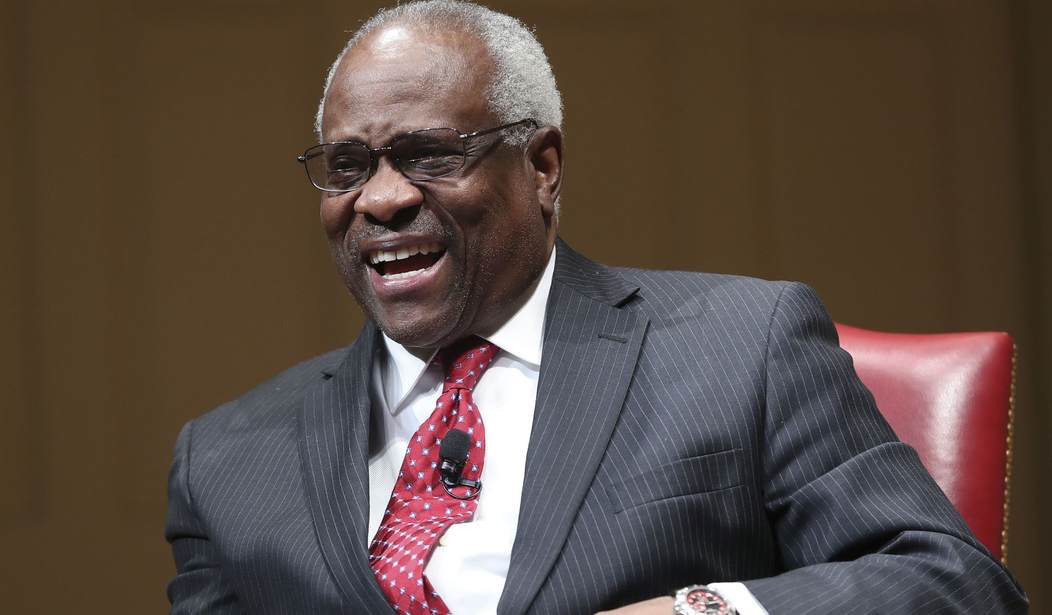If you claim your heart didn’t skip a beat at this newflash yesterday evening, you’re either lying or in worse shape than Clarence Thomas. Late yesterday, news broke that the most senior Supreme Court justice had gone to the hospital with an infection of some sort, when any infection getting to that level is no joke for a septuagenarian. As it turns out, it appears the worst that will happen is that Justice Thomas will miss oral arguments on a few cases.
Those who have followed Thomas’ career might guess that’s more a feature than a bug:
Justice Clarence Thomas, the longest-serving member of the Supreme Court, is hospitalized with an infection and being treated with intravenous antibiotics, the Supreme Court announced Sunday night.
Thomas, 73, was admitted to Sibley Memorial Hospital in Washington on Friday evening, according to the release, with flu-like symptoms.
“He underwent tests, was diagnosed with an infection, and is being treated with intravenous antibiotics,” the release said. “His symptoms are abating, he is resting comfortably, and he expects to be released from the hospital in a day or two.”
Like other justices, Thomas has been vaccinated against the coronavirus and received a booster. His illness is not related to covid-19, said Supreme Court Public Information Officer Patricia McCabe.
“Flu-like symptoms” in this case may just mean the actual flu. In fact, if they’re excluding COVID-19 so specifically, that’s almost certainly what it is, especially given the season we’re in. Normally that just requires more fluids and bed rest, but it’s not difficult for people with an acute case to get dehydrated, which often then requires at least a few hours at the hospital to get stabilized. We’ve been through that cycle more than once ourselves. Given Thomas’ position and his age, the hospital probably wants to keep an eye on him to make sure he’s completely stable before they send him home again.
Still, the health scare had some interesting timing, considering what else is on tap today for the Supreme Court. The confirmation hearing process for Ketanji Brown Jackson starts at the Senate Judiciary Committee, although testimony won’t begin until Wednesday. The Washington Post offers a curtain raiser this morning on Brown Jackson’s track record and positions:
Despite her years on the federal bench and as a lawyer in private practice and public service, Judge Ketanji Brown Jackson has had little engagement with many of the hot-button issues dominating the Supreme Court’s attention. …
Jackson would enter the fray next term without much of a judicial track record on abortion. In a related case, she ruled against the Trump administration’s decision to cut grant funding under the federal Teen Pregnancy Prevention Program. In Policy and Research v. HHS, she found that the administration had not properly grounded its action in the mandates of the Administrative Procedure Act.
As a lawyer in private practice, Jackson wrote an amicus brief on behalf of women’s groups defending a Massachusetts law that kept abortion protesters away from the entrances of facilities. It was based on a Colorado buffer zone law that has been upheld by the Supreme Court. The Massachusetts law was upheld by the U.S. Court of Appeals for the First Circuit, and the Supreme Court denied review. …
Jackson has often sided with labor unions, striking down key provisions of Trump administration orders in 2018 that would have made it easier to fire federal employees and weaken their representation.
It’s a usable road map for the questions to come, but there aren’t any surprises. Joe Biden picked a reliably progressive nominee, one who will almost certainly clear all of the hurdles in the Senate to confirmation — although Karen Townsend will have more in an upcoming post on a tactic Republicans could choose to use. Even if the GOP somehow managed to deny KBJ confirmation, Biden would turn around and nominate someone out of the same mold. Elections have consequences, and Supreme Court nominations is one of those.
And of course, this is also one reason why we’re glad to hear of Justice Thomas’ recovery. Brown Jackson’s confirmation won’t impact the balance of the court, at least not in the present, but a replacement for Thomas certainly would. He’s been a stalwart for judicial restraint and originalism and textualism to a certain degree, the principle that the Constitution says what it says and does not say what it doesn’t say. What the Constitution does not address should not be discerned in penumbras or emanations, but left to the states and to the people, just as the Constitution itself commands. If the courts followed Thomas’ philosophy of judicial modesty, the confirmations of judges would need not be anywhere as politicized as they have become, and KBJ’s hearing this week would be a footnote rather than a headline.
So get well soon, Justice Thomas. Your work is not yet done.







Join the conversation as a VIP Member